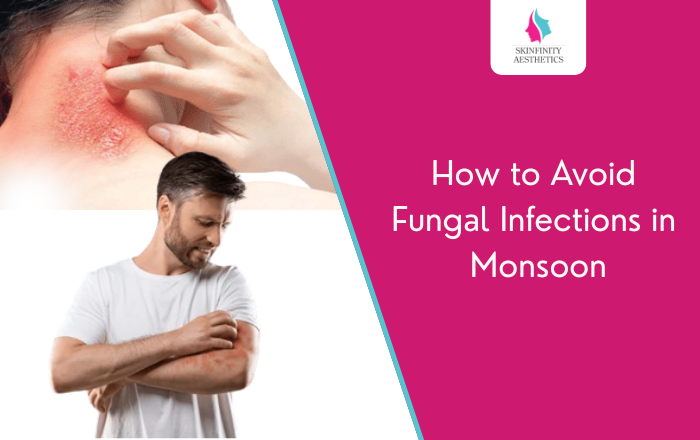The monsoon brings refreshing rains, cooler air, and lush greenery. But along with all this beauty, the season also brings a hidden problem—fungal infections. Many people start experiencing itching, redness, or rashes during this time, especially in areas like the underarms, feet, and groin. If you’ve dealt with it before, you know how uncomfortable it can get.
In this blog, let’s talk about how to avoid fungal infections in monsoon, using simple tips that actually work. You’ll also find easy home remedies, skincare habits, and when it’s time to visit a skin clinic.
Why Fungal Infections Are Common in Monsoon
– Moisture + Warmth = Fungal Growth
Fungi thrive in warm, damp conditions. During monsoon, the humidity in the air increases, and our skin often stays wet longer due to sweat or rainwater. These moist conditions, especially in skin folds or between toes, become perfect places for fungal infections to grow.
– Most Affected Areas
- Underarms
- Groin and inner thighs
- Feet and toenails
- Between skin folds (under the breasts, abdomen)
How to Prevent Fungal Infections During Monsoon
– Maintain Good Daily Hygiene
- Shower daily, especially after getting drenched in the rain.
- Always dry your body completely, especially between toes, behind knees, and skin folds.
- Use an antifungal powder on areas that sweat often like underarms, groin, and feet.
- Wash sweaty clothes daily and avoid repeating them without a wash.
– Take Care of Your Feet
- Don’t walk barefoot on wet surfaces.
- Change your socks every day—even twice a day if they get damp.
- Wear shoes that allow air to pass through. Avoid wearing the same wet shoes repeatedly.
- Dry your footwear in the sun if they get wet.
– Choose the Right Clothing
- Wear loose, cotton-based clothes. Tight or synthetic fabrics trap sweat.
- Change innerwear daily, even more often if you’re sweating a lot.
- Keep a backup set of dry clothes at work or while traveling during rainy days.
Home Remedies to Try at Home
Some natural remedies may help soothe your skin and protect it from mild fungal infections:
1. Neem Water Bath
Boil a few neem leaves in water, let it cool, and use it for bathing. Neem has antifungal and calming properties.
2. Apple Cider Vinegar Soak
Mix a cup of apple cider vinegar in warm water and soak your feet for 15 minutes. It helps restore skin pH and keeps fungi away.
3. Tea Tree Oil
Dilute a few drops of tea tree oil in coconut oil or water and apply to affected areas. It has antifungal and antibacterial properties. (Always do a patch test.)
– Habits to Avoid During Monsoon
- Avoid these common mistakes that can increase the risk of infection:
- Ignoring early signs like itching or redness
- Wearing wet clothes or shoes for long hours
- Using talcum powders (they trap moisture and worsen the issue)
- Sharing towels, razors, or shoes with others
– When to See a Doctor
Some infections go away with care, but others may need treatment. You should visit a skin doctor if:
- You see spreading red patches with itching
- There’s cracking or peeling of the skin
- You have recurring infections
- There’s a foul smell or discharge
– Don’t Let Fungal Infections Spoil Your Monsoon!
Taking small steps every day can protect your skin from fungus. Stay clean, dry, and avoid damp clothes or shoes. But if irritation continues or gets worse, it’s best to talk to a skin specialist.
Looking for the Right Help?
If you’re in Airoli and need help with monsoon-related skin issues, we recommend visiting the Best skin clinic in Airoli — Skinfinity Aesthetics Laser Clinic.
Skinfinity Aesthetics Laser Clinic, Airoli
Dr. Priyanka Tambe offers treatments for various skin infections and concerns. The clinic provides focused care for issues that become common during the rainy season, such as fungal infections, itching, and rashes.
Whether you’re dealing with recurring skin irritation or unsure about what remedies are safe to try, this clinic offers the support you need.
FAQs
Q1. Can I use talcum powder to keep my skin dry?
No, talcum powder can make it worse. Use a medicated antifungal powder recommended by your doctor.
Q2. Are fungal infections contagious?
Yes, some types can spread through shared towels, clothes, or shoes. Maintain personal hygiene and avoid sharing such items.
Q3. Why do I get fungal infections every monsoon?
Monsoon increases humidity, which makes skin folds sweaty and damp—ideal for fungus to grow. Not drying off completely or repeating damp clothes also adds to the risk.
Don’t ignore your skin—book a consultation and see the improvement yourself.
